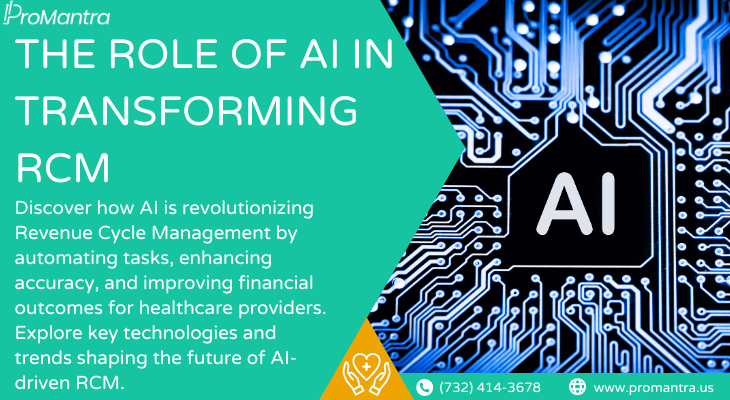The integration of Artificial Intelligence (AI) into Revenue Cycle Management (RCM) is revolutionizing the healthcare industry. Traditionally, RCM has been burdened by complex administrative tasks, billing issues, and the ever-present risk of human error. However, AI in RCM is not only streamlining these processes but also enhancing the overall efficiency and profitability of healthcare organizations. This blog explores how AI is transforming RCM, focusing on key technologies, applications, and the future of AI-driven revenue cycle intelligence.
The Current State of AI in RCM
AI’s adoption in healthcare, particularly in RCM, has accelerated in recent years. Many healthcare organizations are recognizing the potential of AI in automating routine tasks & providing insights that can lead to better financial outcomes.
Adoption Rates and Trends
AI’s adoption in healthcare, particularly in RCM, has accelerated in recent years. Many healthcare organizations are recognizing the potential of Artificial Intelligence in automating routine tasks & providing insights that can lead to better financial outcomes. According to a recent survey, over 60% of healthcare providers are either using or planning to implement AI-driven solutions in their RCM processes within the next two years. This surge in adoption is driven by the need to reduce operational costs, improve accuracy, and enhance patient satisfaction.
Survey Statistics
Survey data indicates that AI adoption in RCM is not just a trend but a strategic move for many healthcare providers. For instance, a study by Wipro shows that organizations leveraging AI in RCM have seen a 30% reduction in denials and a 20% increase in cash flow. These statistics underscore the tangible benefits of AI in optimizing revenue cycles.
Market Adoption Overview
The market for AI in RCM is rapidly expanding, with significant investments from both established healthcare providers and startups. The demand for AI-driven solutions is expected to grow as healthcare providers increasingly seek to automate processes & decerease the administrative burden on their staff.
Key Technologies in Use
Several key technologies are driving the adoption of AI in RCM. These technologies are helping healthcare providers streamline their revenue cycle processes, reduce errors, and improve financial outcomes.
RPA (Robotic Process Automation)
Robotic Process Automation (RPA) is one of the foundational technologies driving AI adoption in RCM. RPA automates repetitive tasks such as data entry, claim submission, and payment posting, allowing human resources to focus on more strategic activities. By decreasing the time spent on manual processes, RPA significantly enhances the efficiency of RCM.
NLP (Natural Language Processing)
Natural Language Processing (NLP) is another critical AI technology in RCM. NLP enables healthcare providers to extract information from unstructured data, such as physician notes & patient records. This capability is particularly useful in automating coding and billing processes, ensuring that claims are accurate and compliant with regulatory standards.
Machine Learning
Machine Learning (ML) is at the heart of AI-driven RCM, enabling systems to learn from historical data and improve over time. ML algorithms are used to predict claim denials, optimize payment processes, and forecast revenue, making them invaluable tools for healthcare providers looking to enhance their financial performance.
AI Applications in RCM
AI is being applied in various aspects of RCM to enhance efficiency, reduce errors, and optimize revenue cycles.
Automated Coding and Billing
AI-driven automation in coding and billing is transforming RCM by reducing errors and speeding up the revenue cycle. Automated coding systems can analyze patient records, assign the appropriate codes, and generate bills with minimal human intervention. This not only lowers the risk of errors but also ensures that billing is done promptly, leading to faster reimbursements.
AI-driven NLP
NLP-powered AI tools are revolutionizing how healthcare providers handle unstructured data. By converting text into structured data, these tools facilitate more accurate coding and billing, ultimately improving the overall efficiency of RCM processes.
Claim Scrubbing
AI-powered claim scrubbing tools automatically review claims before they are submitted, ensuring they meet payer requirements. This pre-submission review helps reduce the likelihood of claim denials, thereby improving the overall success rate of reimbursements.
Predictive Analytics for Denial Management
Predictive analytics, driven by AI, is becoming increasingly important in denial management. By analyzing historical claim data, AI can predict which claims are most likely to be denied & provide recommendations for preventing these denials. This proactive approach enables healthcare providers to address potential issues before they result in revenue loss.
Denial Prediction and Resolution
Machine learning models are particularly effective in predicting and resolving claim denials. These models analyze patterns in denied claims, identify common reasons for denials, and suggest corrective actions. By addressing these issues proactively, healthcare providers can reduce denial rates and improve their overall revenue cycle performance.
Revenue Forecasting and Financial Planning
AI-powered analytics tools are transforming how healthcare providers approach revenue forecasting and financial planning. These tools analyze enormous amounts of data to generate accurate financial forecasts, enabling providers to make informed decisions about resource allocation and budgeting.
Patient Payment Optimization
AI is also enhancing patient payment processes by enabling the creation of personalized payment plans. These plans are tailored to each patient’s financial situation, making it easier for patients to manage their healthcare costs while ensuring that providers receive timely payments.
Enhanced Data Security and Compliance
Artificial Intelligence plays a crucial role in enhancing data security and compliance in RCM. Machine learning algorithms can detect patterns indicative of fraudulent activity, enabling healthcare providers to identify and mitigate potential fraud before it results in significant financial loss.
Challenges and Considerations
Despite the numerous benefits of AI in RCM, there are challenges and considerations that healthcare providers must address.

Risk Management and Accuracy
While AI offers numerous benefits, it also presents certain risks, particularly concerning accuracy. Healthcare providers should ensure that AI systems are properly trained and validated to minimize the risk of errors in coding, billing, and other RCM processes.
Data Bias Mitigation
One of the challenges of implementing AI in RCM is the potential for data bias. AI systems trained on biased data can perpetuate these biases, leading to inaccurate predictions and recommendations. Healthcare providers should take steps to identify and mitigate bias in their AI systems to ensure fair and accurate outcomes.
Validation of AI Outputs
Healthcare providers must regularly validate the outputs of their AI systems to ensure they align with clinical and financial goals. This validation process is crucial for maintaining the accuracy and reliability of AI-driven RCM tools.
Workforce Impacts
The adoption of AI in RCM will inevitably impact the workforce. While some jobs may be automated, others will evolve, requiring new skills and training. Healthcare providers must invest in training programs to help their staff adapt to these changes and take full advantage of AI-driven RCM tools.
Future Outlook for AI in RCM
The future of AI in RCM holds promise, with emerging trends and innovations set to further transform the industry.
Emerging Trends and Innovations
The future of AI in RCM looks promising, with several emerging trends & innovations on the horizon. These include the development of more sophisticated machine learning models, the integration of AI with blockchain for enhanced data security, and the use of AI to support value-based care initiatives.
Predictions for AI Integration
As AI continues to evolve, its integration into RCM processes will likely become more seamless and widespread. In the coming years, AI is expected to play an even more significant role in driving efficiencies, reducing costs, and improving patient outcomes in healthcare.
Long-term Impact on Healthcare Operations
In the long term, AI’s impact on healthcare operations will be profound. By automating routine tasks, improving accuracy, and providing valuable insights, AI will enable healthcare providers to focus more on patient care and less on administrative burdens, ultimately leading to better patient outcomes and more sustainable healthcare operations.
Conclusion
The integration of AI into RCM is no longer a futuristic concept but a present reality that is transforming healthcare operations. From automating routine tasks to enhancing data security and compliance, AI is revolutionizing how healthcare providers manage their revenue cycles. While challenges remain, the benefits of AI in RCM are undeniable, offering the potential for improved efficiency, profitability, and patient satisfaction.
How ProMantra Can Help
At ProMantra, we understand the challenges that healthcare providers face in managing their revenue cycles. Our AI-driven solutions are designed to optimize RCM processes, reduce claim denials, and improve overall financial performance. With our expertise in AI and healthcare, we can help you navigate the complexities of RCM and achieve your financial goals. Partner with ProMantra today to unlock the full potential of AI in your revenue cycle management.





